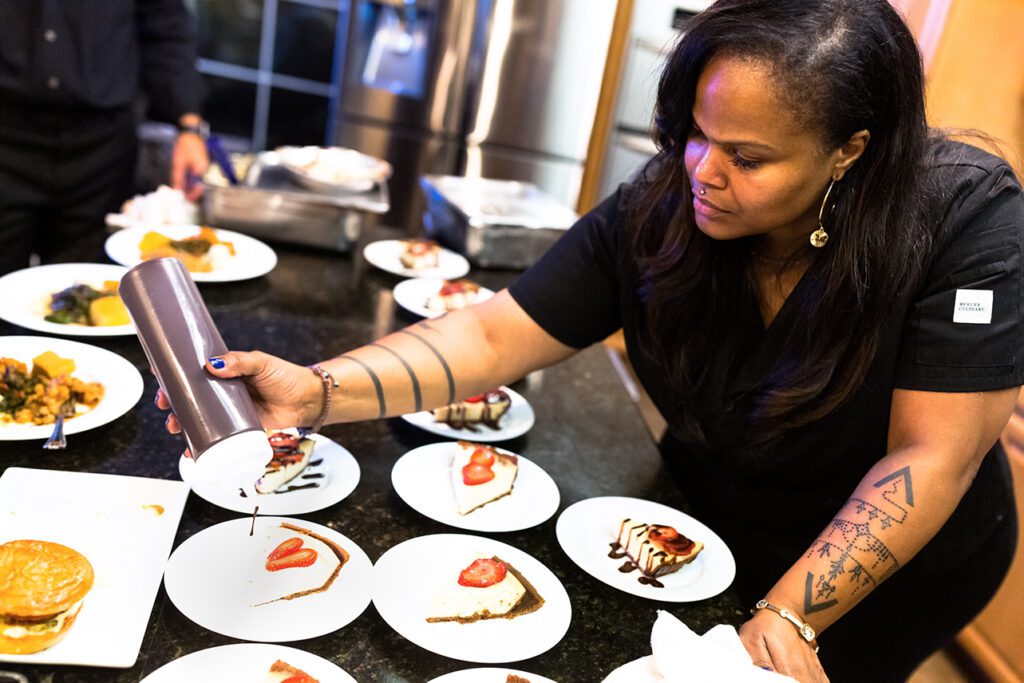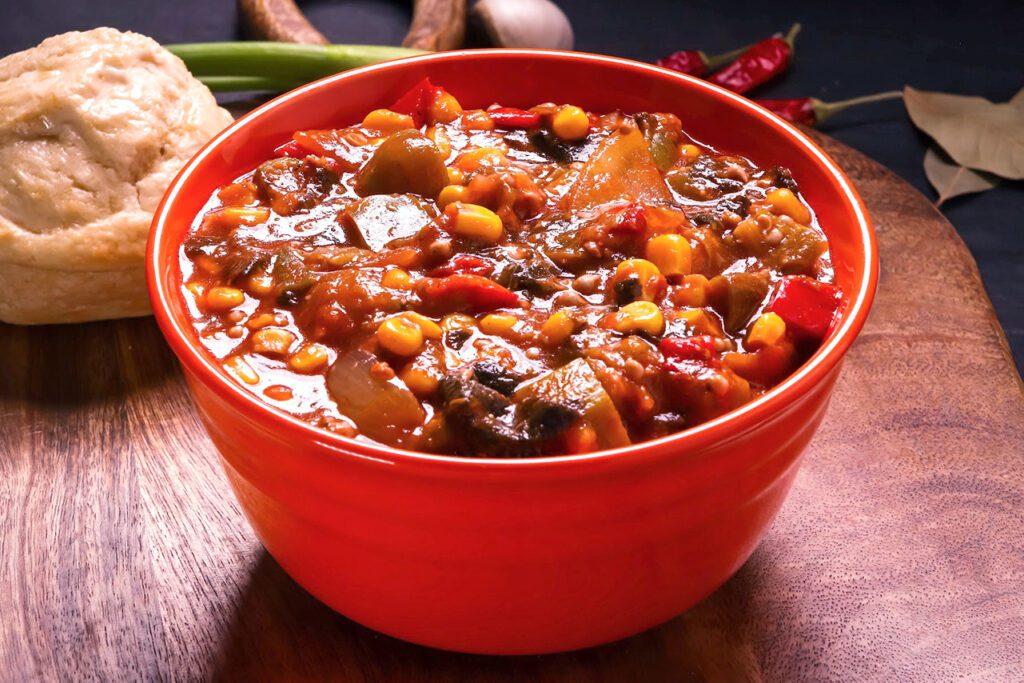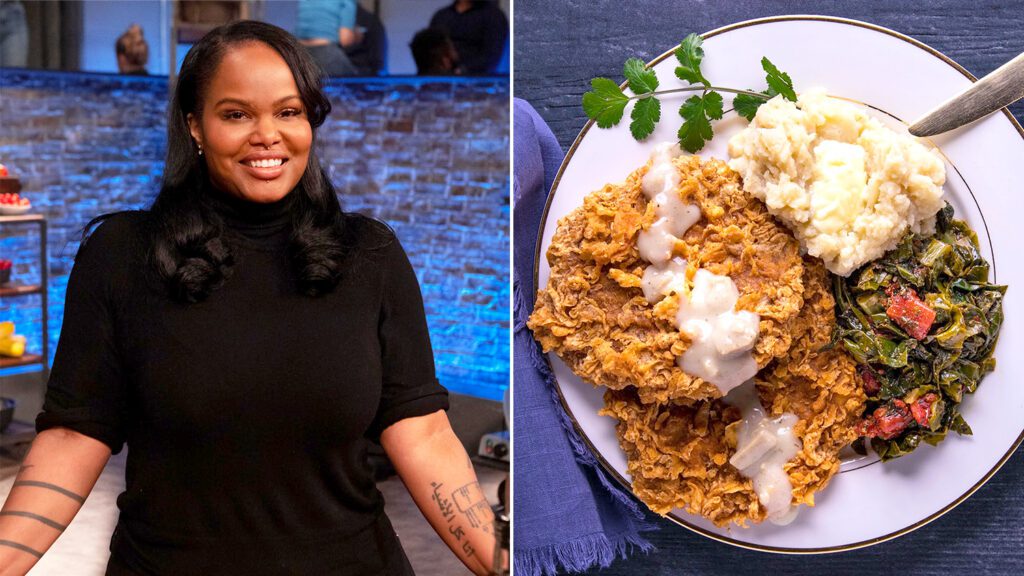During the past 29 seasons of the Food Network’s Beat Bobby Flay, not once has the star chef removed his apron and bequeathed it to a challenger. That all changed when Tamearra Dyson wielded her knife and her plant-based prowess onstage in the third episode of Season 30. The veteran chef and owner of Souley Vegan slayed Flay in a plant-based burger throwdown, with five out of five judges picking her craveable spiced tomato and cremini mushroom patty topped with homemade vegan cheddar and pickles.
Twelve years ago, Dyson would’ve never dreamed of beating Bobby Flay, much less standing on the same stage as him. When she opened Souley Vegan in July 2009, she owned one pair of pants and 27 dollars—the latter a gift her sister slipped in the cash register just before Dyson flung open the doors.
Dyson has fought tooth and nail to fulfill her destiny of opening her own restaurant. All along her journey, she took ambitious risks to succeed in the restaurant industry. Growing up mostly vegetarian, she began cooking vegan dishes while pregnant with her son. In 2007, she left a stable medical job to pursue the culinary arts—despite being a single mother with zero savings.
Working as a caterer and vendor at local markets, she saved as much as she could. One day, she stumbled upon the perfect empty storefront at 301 Broadway in Downtown Oakland—but her lack of deposit funds and low credit store loomed like dual storm clouds over her dream. With the help of a generous customer and a landlord willing to believe in her passion and dedication, she was able to secure the space. “I literally got the total sum in my hand 20 minutes before I was due to meet my landlord to sign the contract to seal the deal,” Dyson recalls.
Today, the chef owns not one, but four Souley Vegan locations—and she’s reveling in her success as her plant-based cuisine basks in the limelight, from the Food Network to San Francisco and Las Vegas.
Dyson doesn’t want everyone to have to struggle this hard to become a restaurant owner, especially chefs of color, so she has advice for young beginners. The successful entrepreneur spoke with us about how food insecurity can influence mental health struggles, the lessons she learned from her working-class mother, and the cuisine at her soon-to-debut Cajun restaurant.

How a vegan chef beat Bobby Flay
LIVEKINDLY: Your win is historic—you’re the first vegan chef to beat Bobby Flay. How does it feel to earn that crown with a plant-based burger?
Tamearra Dyson: Yes, I beat Bobby Flay, but I’ll tell you this… it almost didn’t happen. Souley Vegan was going through busy times, with an expansion. When I got the call asking me to come, I almost didn’t go, because I didn’t know if I had the time to dedicate to it, but I thought, “I have to go—I never back down.”
LIVEKINDLY: Was there a point when you just knew you were going to beat him?
Dyson: When they said vegan burgers, I knew that Bobby’s was going to fall apart. As soon as I heard him say he was using chickpeas, I thought, “He’s going in the wrong direction.” I yelled, “It’s going to fall apart”—I even warned him. But also, I felt in my spirit that I was going to beat him, so I was ready to win. The producers chose me, but my journey earned me the right to be there. Bobby told me my energy filled that place, and he told me it was the greatest episode ever, and that he had never taken off his apron and given it to another chef.
LIVEKINDLY: So will you be following in Bobby Flay’s footsteps? You’ve already got four restaurants—why not a Food Network show, more restaurants, a cookbook, or a full-on empire?
Dyson: I see myself doing it all—I have a desire to share something of myself. Bobby does it all—he has restaurants and shows, and I see myself like that. My wheelhouse is Souley Vegan, but anybody who aspires to cook watches the Food Network—it could definitely serve as a springboard to aspire to greater heights. I am not necessarily that person or that chef that says let me apply because I want to compete—I love to share, I love to teach, I’ve spoken at several colleges, schools, and events, because I find it’s really where I shine.
LIVEKINDLY: A recent panel you spoke on focused on food insecurity and structural racism. What was the key message you wanted to convey to students?
Dyson: The students look at me and they say, “You’re a success,” so I say, “Cool, let me tell you about my history,” so they see we’re the same. At the panel, I said that my mother, who has suffered from depression, once shared with me that she had considered suicide several times, but one particular time when it was going on the third day we had not eaten, was particularly bad—there’s nothing worse than seeing a kid hungry. I would see my mother sit by the phone for an hour before picking it up to call someone for help with feeding us. There were so many times we did not eat for days at a time.
Once we all understand we’re the same, things get a little better. Nobody deserves to be on a pedestal—we’re all the same. We all need to talk about mental health, food insecurity, and structural racism. God bless our communities for being there for us.
This whole ride with Souley Vegan has been hard work, not a miracle.
—Tamaerra Dyson
LIVEKINDLY: The co-host and judge for your episode, Mark Cuban, is a well-known vegan investor, betting on everything from plant milk machines to vegan pork rinds. Would you want to develop a frozen or packaged food line with him—say, those vegan burgers that beat Bobby Flay?
Dyson: Listen, this whole ride with Souley Vegan has been hard work, not a miracle, but if you read our stories, where I come from, and how we started, that journey—I wouldn’t be surprised if a partnership happened. Sunny [Anderson] and Mark were eating the food, and Sunny said, “This is the best vegan burger I’ve ever had.”
LIVEKINDLY: Let’s talk about that journey. You’ve spoken about how your single mom worked as a grocery cashier every day, in order to be there for her children. You said that you learned from her actions how to survive, and also that you wanted to be able to help both your family and your community with these working-class struggles.
Dyson: My mom taught me work ethic, and I would see her in the morning getting ready—putting on lipstick and getting ready. But also, I could see her getting herself ready to go to a place that she dreaded, but she had to do it to feed her kids. I watched her; I saw her do that every day. She smiled, and she worked through it.
My creativity in the kitchen definitely has a great deal to do with my mother, because she made something out of nothing.
LIVEKINDLY: You struggled to scrape together the cash for your first Souley Vegan location in Oakland. It’s harder for Black entrepreneurs to get business loans—we’ve seen this repeatedly, and in this report it was documented less than 47 percent of applications from Black business owners are approved. How can Black restaurant owners defy this and keep going for their dreams, until we see an institutional sea change?
I believed in myself and what I had to serve. I believed in Souley Vegan.
—Tamaerra Dyson
Dyson: It’s definitely not a level playing field. I had under $30 in the cash register and it made absolutely no sense for me to go for it, but I believed in myself, in my products, and in what I had to serve—I believed in Souley Vegan. That made me push and we opened the doors. The money I made that first day, I took to the store and bought the produce that I needed for the second day. I couldn’t afford staff, so I was the first one in and the last to leave. I took your order, cooked it, and delivered it. My old job at the hospital was asking me to come back. “You’re struggling, you’re a single mom—come back.” Going back wasn’t an option. Maybe I was absolutely insane, but I believe—and I’m spirit-first, that’s why Souley Vegan is named after the soul—in what I’m doing. The spirit was the push and the drive that helped me when I was on my knees, just saying, “God, how am I going to do this?”
LIVEKINDLY: Black veganism as a movement is an intersectional issue connecting social justice, health, modern abolitionism, and community joy, and has been incredibly empowering for many. Black vegan chefs are leading the food movement right now. How do you see yourself in that movement?
Dyson: When the community sees someone who looks like them representing them, they are more receptive to that. A lot of Black celebrities got on board with the vegan movement, and it’s been extremely impactful. I started when there wasn’t as much awareness, so I had to build Souley Vegan around teaching and inviting people in, starting at the farmers’ market with samples. Since then, I do a lot of community work, and now a lot of Black chefs are emerging from these communities and having impact in their communities.

LIVEKINDLY: You’re very involved in social impact initiatives in Oakland. What specifically would you like to do more of?
Dyson: We’ve donated to so many schools and organizations—it’s who I am. On paper, it doesn’t make the most sense to be giving away so much, but I operate from a different platform. My mother couldn’t afford to feed us three children, and I’m the youngest of three. I went to Hoover Elementary in Oakland, and I would be hungry going to school. I had a friend who used to meet me to walk to school, and her family would prepare a full breakfast for her every morning, but she wouldn’t finish the pancakes and eggs, and there was a part of me that said, “How could you not finish that?” because I was so hungry. An associate of mine in non-profits wants me to start a non-profit for kids who can’t afford school lunches. She saw a young boy who knocked a prepared lunch out of another boy’s hands, because he was hungry. I’ve been there, and that’s why I’m passionate about ending food insecurity.
LIVEKINDLY: Your next project is opening up a new restaurant behind your Oakland spot called The Back Porch. We’re expecting all the vegan po’boys and okra gumbo, which Guy Fieri raved about on his show Diners, Drive-Ins and Dives, but any can’t-miss items?
Dyson: So we’re reinventing ourselves and opening up a space with mostly outdoor seating, with a Cajun bar and bites theme. We’ll have an insane Cajun mac and cheese—I don’t think anybody is ready. It’ll be open at the end of March. We’re also going to have some new menu items coming at Souley. We’re going to do a tuna melt with hearts of palm as the tuna, called The Meltdown. We’ll also be adding the Beat Bobby Flay Burger to the (Souley) menu.


